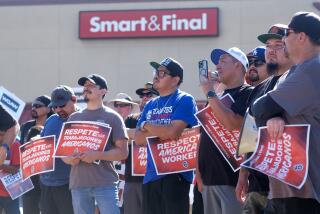Maquiladora Lockout Reflects the Industry’s Growing Pains
- Share via
SAN DIEGO — More than 1,200 workers at two Tijuana manufacturing plants have been idled in a bitter dispute that illustrates the growing pains affecting companies doing business in the booming maquiladora industry.
The dispute also comes at a time when labor problems are beginning to surface among maquiladoras, which are foreign-owned factories in Mexico set up to take advantage of low-cost labor to produce goods for sale in foreign markets.
The dispute involves employees of a Tijuana maquiladora doing work for Alaris Medical, a San Diego-based medical supplies manufacturer embroiled in a dispute with a Newport Beach-based firm contracted to run its Mexico operation.
Workers have been unable to enter two plants operated for Alaris by Cal Pacifico, a Newport Beach “shelter,” or maquiladora contracting firm, since last Tuesday. Further disruption could significantly hurt Alaris Medical, as its Tijuana plants account for half its worldwide work force and produce much of its disposable medical products such as intravenous tubing.
Sources say the problem began when Alaris--the name since November for the merged Imed and Ivac medical equipment and supply companies--served notice to Cal Pacifico two months ago that it wanted to leave the shelter arrangement and operate the Tijuana plants on its own. Such a move for independence is common among U.S. companies once they become comfortable operating in Mexico.
But Cal Pacifico resisted, saying it is owed a substantial sum of money to dissolve the arrangement, sources said. Alaris refused to pay, saying it met the terms of its contracts and gave ample notice that it was going out on its own.
The dispute escalated last Tuesday when Cal Pacifico forcibly ejected several Alaris Medical executives from the Tijuana plants and shut the factories down. Alaris Medical attempted without success to slap a temporary restraining order on Cal Pacifico to reopen the plants, an Alaris spokeswoman said Monday.
Shutting down the plants was within Cal Pacifico’s rights as the company is the plants’ nominal operator and employer as Alaris’ proxy. But some observers, who asked not to be identified, were puzzled as to why Cal Pacifico took action in Mexico, when both companies are headquartered in the United States and presumably can seek legal remedies here.
Neither Cal Pacifico executive Gus Verge nor the company’s outside attorney, Andrew Kaplan of San Diego, would comment because the issue is in litigation.
Alaris Medical declined to comment on the dispute. Investors in publicly traded Alaris apparently are not alarmed: Its shares rose 19 cents to close at $4.125 in Nasdaq trading.
The dispute exemplifies the pitfalls facing companies operating in Mexico. While U.S. and other foreign firms operating there are enjoying enormous labor-cost savings, they also must deal with rapid turnover, occasional strikes and--as this case illustrates--a murky legal environment.
Baja California is now home to about 800 foreign-owned maquiladoras employing 130,000 workers churning out a plethora of products, from televisions and furniture to eyeglasses and truck trailers.
Mario Escobedo, the Tijuana delegate of the federal Secretary of Business and Industrial Development, which is responsible for regulating the maquiladora industry, described it as a “private conflict over money” between two U.S. companies with no Mexican involvement. But he said he will try to mediate some settlement between the two firms this week.
More to Read
Sign up for Essential California
The most important California stories and recommendations in your inbox every morning.
You may occasionally receive promotional content from the Los Angeles Times.













